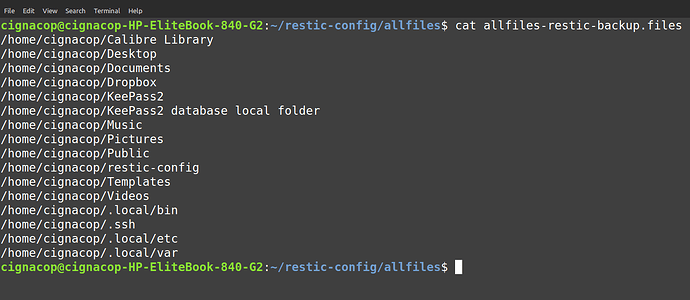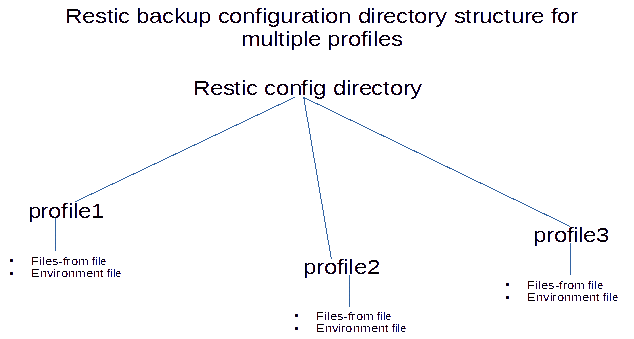Here is a Bash shell script that I have tested successfully on Linux for automating restic based backups using either cron or anacron.
#!/usr/bin/env bash
This script should be run via cron
set -o errexit
Default values for options
restic_config_dir=“${HOME}/restic-config”
log_dir=“${HOME}/.restic-log”
interval=$((0)) # Default interval is take backup immediately
delay_value=$((0)) # Default delay is no delay
backup_tag=“none” # Default backup tag
profile_name=“” # Set profile to null
backup_output=“”
Help message function
help_message() {
echo “Usage: $(basename $0) [-c RESTIC_CONFIG_DIR] [-l LOG_DIR] [-i INTERVAL] [-d DELAY] [-t backup identifier hourly, daily, weekly or monthly] [-p backup profile name] [-h]”
echo “Options:”
echo " -c RESTIC_CONFIG_DIR Path to the directory containing restic configurations root. Defaults to $HOME/restic-config"
echo " -l LOG_DIR Path to the directory where log files would be stored. Defaults to $HOME/.restic-log"
echo " -i INTERVAL Interval in minutes (m), hours (h), or days (d). Defaults to 0 immedfiate"
echo " -d DELAY Delay in seconds (s), minutes (m), or hours (h). Defaults to 0 no delay"
echo " -t FREQUENCY Tag to add to backups such as hourly daily weekly monthly or whatever you choose here."
echo " Defaults to the hostname-machine-id if not provided"
echo " -p PROFILE restic backup profile name. Mandatory option"
echo " -h Show this help message and exit"
}
Parse command line options
while getopts “:c:l:i:d:t:p:h” opt; do
case $opt in
c)
restic_config_dir=“$OPTARG”
;;
l)
log_dir=“$OPTARG”
;;
i)
interval_unit=“${OPTARG: -1}” # Get the last character of the option argument
interval_value=“${OPTARG%?}” # Remove the last character from the option argument
if ! [[ “$interval_value” =~ ^[[:digit:]]+$ ]]; then # check if a non negative integer
echo “Error: Backup interval ${interval_value} must be a valid integer greater than or equal to 0.”
exit 1
fi
case “$interval_unit” in
m) interval=$((interval_value * 60)) ;; # Minutes to seconds
h) interval=$((interval_value * 3600)) ;; # Hours to seconds
d) interval=$((interval_value * 86400)) ;; # Days to seconds
*)
echo “Invalid interval unit: $interval_unit” >&2
exit 1
;;
esac
;;
d)
delay_unit=“${OPTARG: -1}” # Get the last character of the option argument
delay_value=“${OPTARG%?}” # Remove the last character from the option argument
if ! [[ “$delay_value” =~ ^[[:digit:]]+$ ]]; then # Check if a non negative integer
log “Error: delay value ${delay_value} must be a valid integer greater than or equal to 0.”
exit 1
fi
case “$delay_unit” in
s|m|h) delay=“${delay_value}${delay_unit}” ;; # sleep duration
*)
echo “Invalid delay unit: $delay_unit” >&2
exit 1
;;
esac
;;
h)
help_message
exit 0
;;
t)
backup_tag=“$OPTARG”
;;
p)
profile_name=“$OPTARG”
;;
?)
echo “Invalid option: -$OPTARG” >&2
exit 1
;;
![]()
echo “Option -$OPTARG requires an argument.” >&2
exit 1
;;
esac
done
shift $((OPTIND-1))
Exit with help message if -p profile_name option not provided
if [ -z “${profile_name}” ]; then
echo “Error: profile_name mandatory command line option missing!”
help_message
exit 1
fi
set backup-tag and files_from restic command line parameter from inputs
backup_tag=“${profile_name}-${backup_tag}”
files_from=“${restic_config_dir}/${profile_name}/${profile_name}-restic-backup.files”
Check if restic --files-from file is present
if [ ! -f “$files_from” ]; then
echo “Error: --files-from file $files_from does not exist! exiting!”
exit 1
fi
Creates the log directory if it does not exist
if ! mkdir -p “$log_dir”; then
echo “Unable to create restic log directory ${log_dir}! Terminating” >&2
exit 1
fi
Create the local cache directory for last run detection if it does not exist
if ! mkdir -p “${HOME}/.cache/restic-backup”; then
echo “Unable to create restic cache directory ${HOME}/.cache/restic-backup ! Terminating” >&2
exit 1
fi
cache file from which restic determines last successful backup run if it exists
restic_cache_file=“${HOME}/.cache/restic-backup/${backup_tag}.restic-backup-last-run-timestamp”
Create restic-backup-last-run-timestamp file if it does not exist
if ! touch “${restic_cache_file}”; then
echo “You do not have write access to ${restic_cache_file}”
exit 1
fi
. /etc/profile
. ~/.profile
. ~/.bashrc
set -euo pipefail
readonly log_file=“${log_dir}/restic.log”
readonly restic_host=“$(hostname)-$(/usr/bin/cat /etc/machine-id)” # Generate repeatable consistent unique id for this host
readonly ping_host=“amazonaws.com” # ping this host to check if internet is accessible
readonly restic_env_file=“${restic_config_dir}/${profile_name}/.${profile_name}.restic.env” # profile specific environment file with Aamazon S3 credentials
Check if we can write to the log file
if ! touch “$log_file”; then
echo “You do not have write access to ${log_file}”
exit 1
fi
Logs a message with a timestamp
log() {
local message=$1
printf ‘%s %s\n’ “$(date ‘+%Y-%m-%d %H:%M:%S’):” “$message” >> “$log_file”
}
Start of backup job
log “Start of backup job”
if ! restic_binary=$(command -v restic); then
log “restic binary not found! Terminating”
exit 1
fi
if ! source “${restic_env_file}”; then
log “Failed to source restic environment file ${restic_env_file}”
exit 1
fi
Check internet connectivity before starting the backup
if ! ping -q -c 1 -W 2 “$ping_host” >/dev/null; then
log “No internet access detected. Backup aborted.”
exit 1
fi
Log input options
if [ “$interval” -eq 0 ]; then
log “No interval specified. Backing up immediately”
else
log “Backup interval specified is ${interval_value}${interval_unit}”
fi
if [ “$delay_value” -eq 0 ]; then
log “Delay option is 0 hence will not sleep”
else
log “Sleep ${delay} before start of backup”
sleep “${delay}”
log “Resuming after sleep”
fi
log “Host ID $restic_host”
log “profile_name: ${profile_name}”
log “config directory: ${restic_config_dir}”
log “log directory: ${log_dir}”
log “Backup tag is ${backup_tag}”
Get last backup time from cache file
read last_backup_snapid last_backup <<< $(/usr/bin/cat “${restic_cache_file}” | awk ‘{print $1 " " $2}’)
last_backup=${last_backup:-0} # set last_backup to 0 if unset or null
Check if last_backup is a valid integer greater than or equal to zero
if ! [[ $last_backup =~ ^[[:digit:]]+$ ]]; then
This is the first time this script is being run
if ! backup_output=$(“$restic_binary” snapshots --latest 1 -c -q --host “$restic_host” --tag “$backup_tag” | grep “$restic_host” | tail -1); then
log “Failed to get last backup timestamp”
exit 1
fi
last_backup_snapid=$(echo “${backup_output}” | awk ‘{print $1}’)
last_backup_human=$(echo “${backup_output}” | awk ‘{print $2 " " $3}’)
last_backup=$(date -d “$last_backup_human” +%s)
else
last_backup_human=$(date -d “@$last_backup” ‘+%Y-%m-%d %H:%M:%S’)
fi
log “Last backup snap ID ${last_backup_snapid} for backup tag ${backup_tag} taken at ${last_backup_human}”
Check if it’s time to take a new backup
current_time=$(date +%s)
time_diff=$((current_time - last_backup))
if [ “$time_diff” -gt “$interval” ]; then
Take a new backup
log “Backup is older than interval specified. New Backup started”
if “$restic_binary” backup --files-from “$files_from” --tag “$backup_tag” --host “$restic_host” -q >> “$log_file” 2>&1; then
backup_output=$(“$restic_binary” snapshots --latest 1 -c -q --host “$restic_host” --tag “$backup_tag” | grep “$restic_host” | tail -1)
last_backup_snapid=$(echo “${backup_output}” | awk ‘{print $1}’)
last_backup_human=$(echo “${backup_output}” | awk ‘{print $2 " " $3}’)
last_backup=$(date -d “$last_backup_human” +%s)
log “Backup succeeded with snap ID ${last_backup_snapid} for backup tag ${backup_tag} at ${last_backup_human}”
else
log “Backup failed with exit code $?”
fi
else
log “Last backup was taken sooner than the interval specified”
log “Not taking any backup”
fi
write last backup timestamp to cache file
echo “${last_backup_snapid} ${last_backup}” > “$restic_cache_file”
End of backup job
log “End of backup job”
###END OF SCRIPT#####


